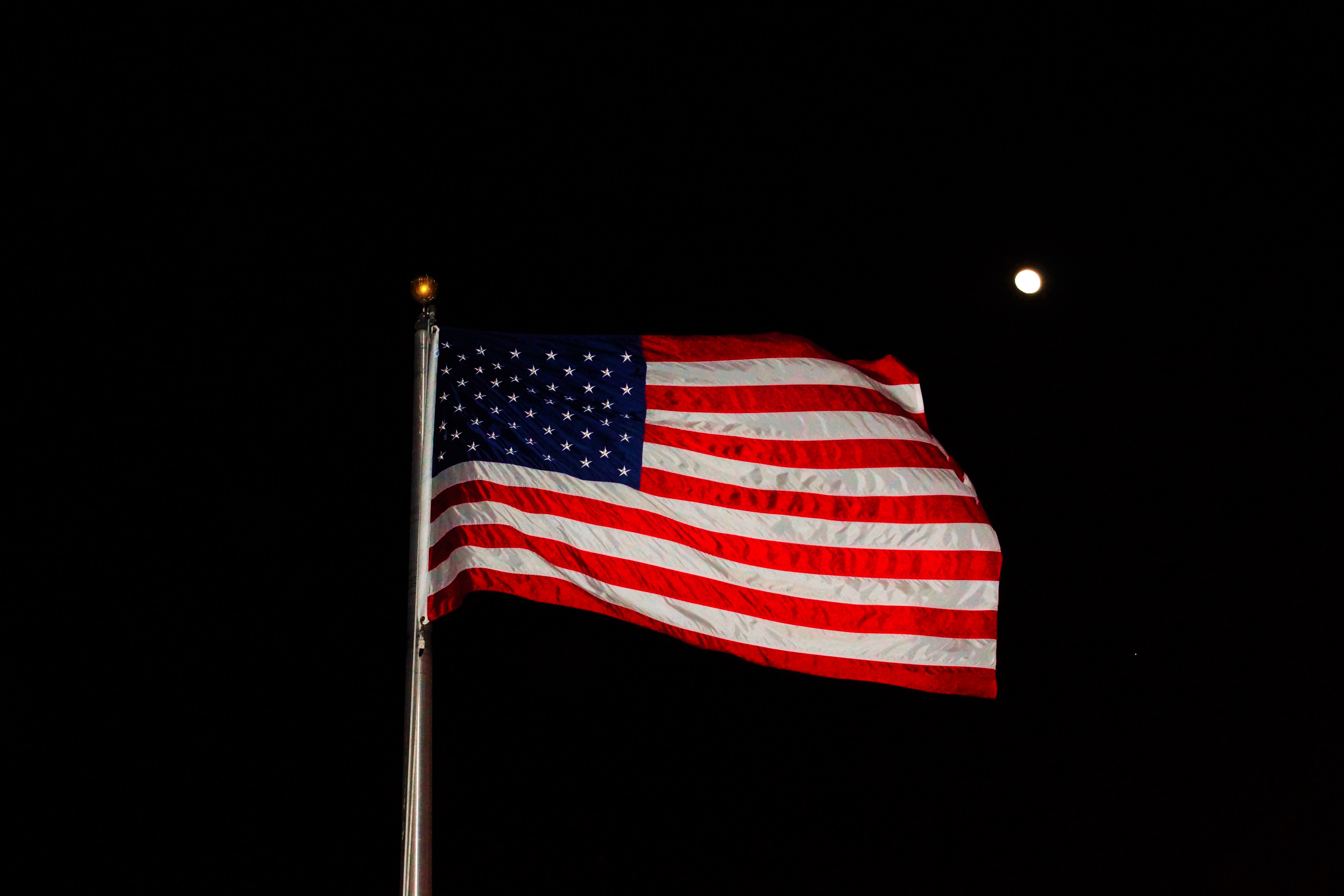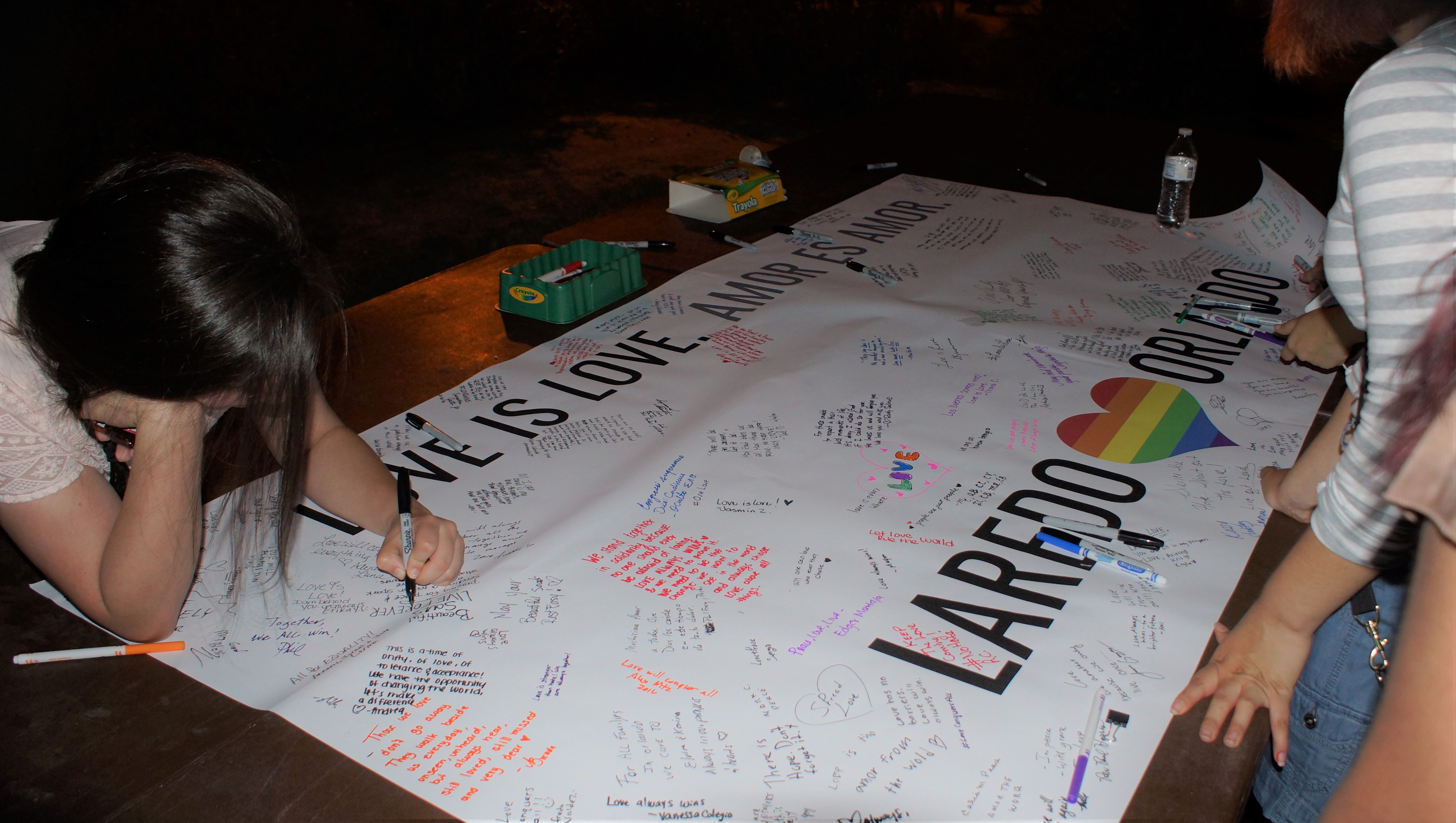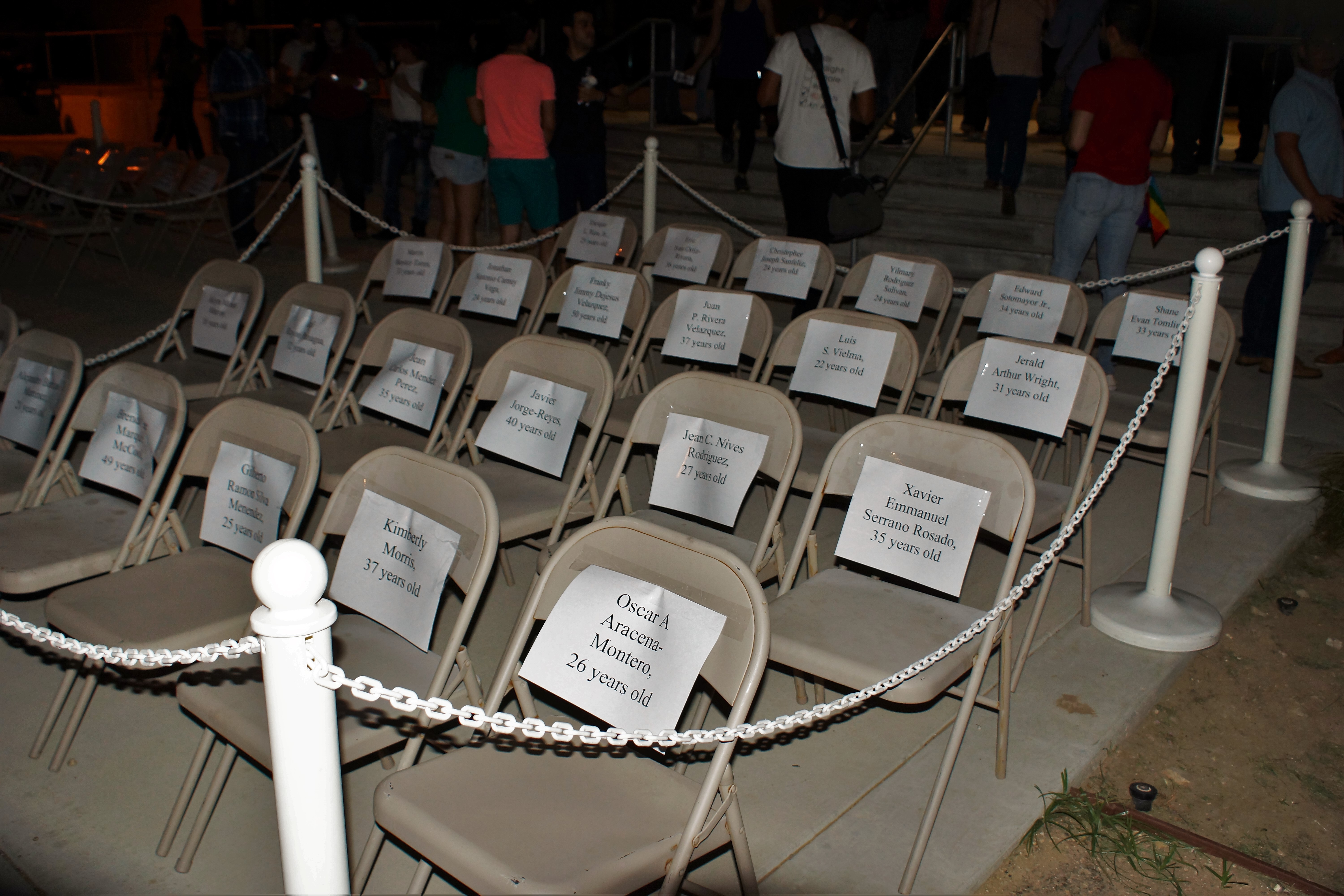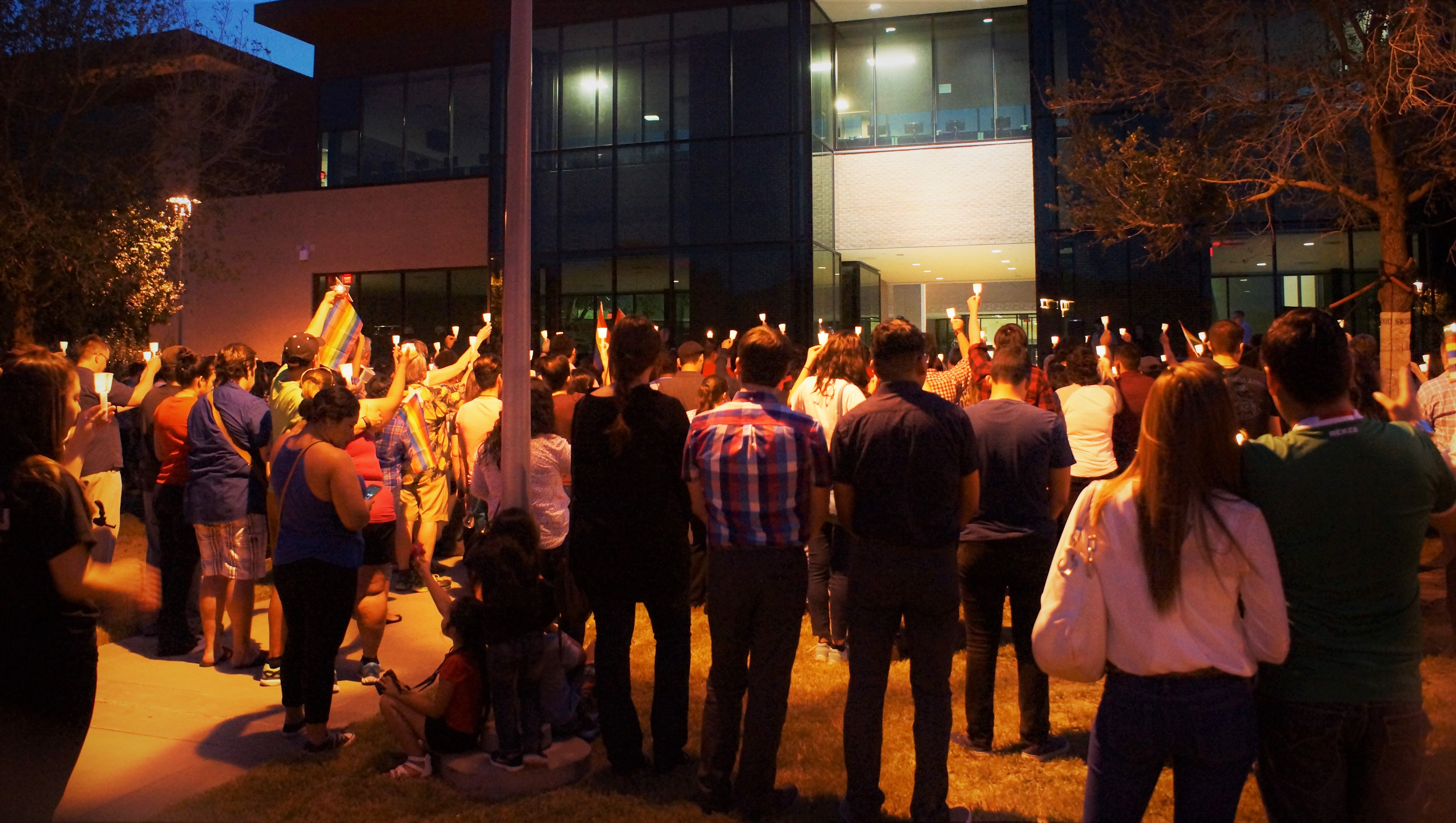Photos by I.M. Kero, who also contributed to this report.
June 12th, 2016 marked a tragic day in American history, as the country mourned its most fatal mass shooting to date. Forty-nine individuals lost their lives in a massacre at Pulse, a gay nightclub in Orlando, Florida. The perpetrator, Omar Mateen, later died in a standoff with police. Forty more victims were hospitalized, many of them in critical condition.
In wake of this tragedy, the victims, their families, and the LGBTQ+ community have received an outpouring of support from across the globe. There was no shortage of support from students and faculty at Texas A&M International University. A vigil was held on the evening of June 16th in the Student Center courtyard to honor the victims and serve as a symbol of allyship. Students and faculty were vocal in their sadness as well as their support in this time of mourning.
The vigil began with an invitation for participants to join graduate student Daniel Alexander Chapa in prayer or a moment of silence. He was then succeeded by staff from the Office of Student Affairs and community partners such as PILLAR.
San Juanita Perez, Associate Director of Student Success Services, stated that her first thought upon hearing of the attacks was, “Why are we here again?”
Her colleague, Teresa Renn, Associate Director for the Office of Student Orientation, Learning, and Engagement said she experienced a myriad of emotions.
“I went back to the last time I felt that extreme pain and for me, that was 9/11,” said Renn. “I immediately knew that something really insane had happened, and [that] we were going to be affected tremendously by it.”
Later on during the vigil, she also stated the massacre hit closer to home for her, as she recently welcomed her first child. She stated that she does not want her son to grow up in an environment of fear such as the one created by the shooting.
Both women agreed that despite the events of June 12th, the tragedy is also bringing out the best in people.
“In the last few days, as we’ve been planning this vigil, I have seen some of the best parts of humanity in our community,” said Renn. “[I’ve received] phone calls from religious leaders, phone calls from students, phone calls from parents who just appreciate what we’re trying to do and have seen a new light…I am hopeful that fuels them to [do] something really, really powerful,” she added.
Renn and Perez, who both serve as advocates for students, were asked what the community can do in regards to taking action.
“I think more than anything, education…whether it’s education about gun safety or mental illness,” said Perez. “Because in many cases, there could be signs before [and] either because we can’t understand something or it’s foreign to us, it can be scary or very easy to dismiss,” added Perez.
Given that the shooter had expressed support for the Islamic State (also known as ISIS) minutes before the attack in a call to 911, many are condemning the shooting as an act of domestic terrorism. Information taken from contacts of Omar Mateen, indicated that he was more disturbed and disgruntled than religiously radicalized. Mateen was a native born US citizen, but some put the blame toward refugees coming from war-torn areas of the Muslim world.
Dr. Stuart Davis, assistant professor of communication, felt the conversations following the shooting have deviated from a much-needed conversation about homophobia into yet another one about radical Islam.
“I think conversations go away from that [homophobia],” admitted Davis. “I feel like more people are more willing to talk about terrorism than talking about domestic problems.”
Still, Davis expressed similar sentiments to Perez and Renn’s in regards to preventing further tragedies.
“It’s great that there’s such an outpouring and that people are obviously invested in this issue. I feel like there’s a lot of love going around at this campus, which is great,” remarked Davis.
However, he also added, “I think at a certain point… we could use the energy we put into praying into educating ourselves and educating people around us.” Davis cited the Safe Zone trainings taught by Renn on campus as a good starting point.
“The care is there and that’s why we pray. But I think that prayer needs to directed towards action,” he concluded.
The politics of tragedy: a commentary on gun control
Though sorrow was generally the overall tone felt around the nation and the parts of the world and at the vigil, the massacre has definitely tapped into the frustration anger of many Americans. Yet again, a terrible mass shooting was carried out by a delusional psychopath, wielding a legally purchased AR-15 rifle. Once again, a Muslim-like character committed a terrorist attack in the heart of America. To some Americans, even the President of the United States, it feels like this is becoming routine.
Without dismay, the event has easily become politicized. Most prominent is the call for greater gun control. Most Democratic figures have called for a ban of assault rifles, particularly aiming at the AR-15. The AR-15 is a civilian model of the military’s M4 carbine and M-16 rifle. Its key difference is that is does not fire in automatic—only in semi-automatic. However, the military and police train their personnel to be effective in semi-automatic fire, and the weapons are used in semi-automatic in almost every firefight by the shooters.
On the right side of the field, the purchase of the weapon and the weapon itself is not the primary concern. Many Americans have their dismay with Radical Islam and even Islam as a religion. Characters on the right feel that the solution to such tragedies is to ban the immigration of Muslims into the country, which spans across three continents and allied nations, and to increase surveillance and prosecution on American Muslims. Even though it violates constitutional rights and possibly human rights considering America’s history of torture of suspected terrorists, there are those adamant that this is a necessary solution.
By a historical approach, assault rifles were weapons designed for militaries and war. Assault rifles were first invented in Nazi Germany during World War II. The first model was Sturmgewehr 44 which was German for “assault rifle model 1944.” After the war, the world’s militaries began developing the own assault rifles. The Soviets made the everlasting AK-47, and the US adopted the M-16 which would modernize to the M4 carbine, the current standard weapon.
America’s gun culture has allowed such weapons to be purchased by civilians. To many, this is unacceptable, and at the root of these horrific tragedy. However, the amount of assault rifles in circulation by the gun industry is tremendous. A ban of assault rifles could cause a discontinuation in manufacturing, but many individuals will still own their weapons, and they may circulate on their own on the black market. To stop that, weapons would have to be confiscated by the government, and that could spell an even bigger dilemma.
Above that is the call to decrease arms regulations. Some believe that if more citizens are armed, the terrorists and mass killers will likely not perform these attacks knowing that there is an assured deterrence. That could be the case, but firearms are costly, people may not have the moral judgement to want to own a firearm such as real religious practitioners, and most people are not soldiers or police officers. Even so, the US invaded two countries with its advanced military, and the terrorists and insurgents continued to fight and still fight.
As the frustration and anger continues to broil in today’s politics, there is middle ground to this issue. People are realizing that a psychopath, brandishing himself as a typical jihadist, managed to go to a regular establishment for gun sales, and purchase an assault rifle like any other citizen. Unlike any other citizen, he then performed the worst mass shooting in US history. Through all of this, Americans are seeing that there is problem. Many view that a common sense solution is make sure those on an FBI watch list are not allowed to purchase firearms. Comprehensive background checks are also being demanded, especially for the purchase of assault rifles.
While the right to bear arms is essential, Americans cannot delude themselves into think that weapons are a patriotic item. Weapons, particularly firearms, are designed for one thing and one thing only: deadly force. They were made to kill people and animals within battles or hunting. Every component of a gun is to advance it purpose in causing damage. A thirty round magazine is used to allow continue fire before having to reload. Special optics allow for swifter aiming and target acquisition. A hair trigger allows for a smoother and easier trigger pull.
All of these qualities sound very effective in a combat situation, but is everyday American life a combat situation? Are the streets of New York, Los Angeles, Orlando, and Laredo anywhere comparable to Fallujah or Aleppo? Maybe they are, or maybe Americans are too fearful. Perhaps in their hearts, Americans know that no real solution will likely come from this, and the next mass shooting may already be in the making. But as TAMIU came today to pray for a brighter future, the most anyone can do is hope.





[…] Read more about TAMIU’s response to this tragedy. […]